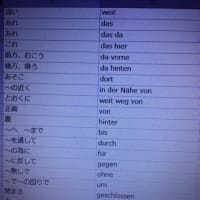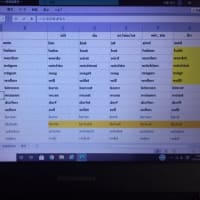239日/366日 239日目 残り日数 127日
目標設定残り127日となってしまいました。
今日の名言・格言・諺(a saying ; a famous saying ; a well-known saying ; a proverb)をひとつ記憶するようにしています。勿論、Englishで記憶!!
One today is worth two tomorrow. Benjamin Franklin
今日という日は、明日という日の二日分の値打ちがある。
「時制の一致」英語で何というのだろう?
文法用語は最低でも知る必要があるといことで、今朝も4時起きで調べてみました。
フランス語では、Concordance des tempsって言いますが、英語のSequene oftensesは、いまいちピンときません。
下記サイトは、BUSUU.COMで友達になった、アメリカ人の教師(小学校)が、良いサイトがあるよと教えてくれたものです。
とても分かりやすいし、英英なので、英語の自然な表現などを覚えながら、文法も勉強できるので重宝してます。
https://owl.english.purdue.edu/owl/resource/540/01/
Sequence of Tenses 時制の一致
Strictly speaking, in English, only two tenses are marked in the verb alone, present (as in "he sings") and past (as in "he sang"). Other English language tenses, as many as thirty of them, are marked by other words called auxiliaries. Understanding the six basic tenses allows one to re-create much of the reality of time in their writing.
Simple Present: They walk 単純現在
Present Perfect: They have walked 現在完了
Simple Past: They walked 単純過去
Past Perfect: They had walked 現在完了
Future: They will walk 未来
Future Perfect: They will have walked 未来完了
Problems in sequencing tenses usually occur with the perfect tenses, all of which are formed by adding an auxiliary or auxiliaries to the past participle, the third principal part.
ring, rang, rung
walk, walked, walked
The most common auxiliaries are forms of "be," "can," "do," "may," "must," "ought," "shall," "will," "has," "have," "had," and they are the forms we shall use in this most basic discussion.
Present Perfect 現在完了
The present perfect consists of a past participle (the third principal part) with "has" or "have." It designates action which began in the past but which continues into the present or the effect of which still continues.
1. Betty taught for ten years. (simple past)
2. Betty has taught for ten years. (present perfect)
The implication in (1) is that Betty has retired; in (2), that she is still teaching.
1. John did his homework. He can go to the movies.
2. If John has done his homework, he can go to the movies.
Infinitives, too, have perfect tense forms when combined with "have," and sometimes problems arise when infinitives are used with verbs such as "hope," "plan," "expect," and "intend," all of which usually point to the future (I wanted to go to the movie. Janet meant to see the doctor.) The perfect tense sets up a sequence by marking the action which began and usually was completed before the action in the main verb.
1. I am happy to have participated in this campaign!
2. John had hoped to have won the trophy.
Thus the action of the main verb points back in time; the action of the perfect infinitive has been completed.
Ainsi l'action du verbe principal indique en arrière à temps(dans le temps)
Past Perfect過去完了
The past perfect tense designates action in the past just as simple past does, but the action of the past perfect is action completed in the past before another action. Le temps de plus-que-parfait désigne l'action dans le passé comme le passé simple fait, mais l'action du plus-que-parfait est l'action complétée(achevée) dans le passé avant une autre action.
1. John raised vegetables and later sold them. (past)
2. John sold vegetables that he had raised. (past perfect)
The vegetables were raised before they were sold.
1. Renee washed the car when George arrived (simple past)
2. Renee had washed the car when George arrived. (past perfect)
In (1), she waited until George arrived and then washed the car. In (2), she had already finished washing the car by the time he arrived.
In sentences expressing condition and result, the past perfect tense is used in the part that states the condition.
1. If I had done my exercises, I would have passed the test.
2. I think George would have been elected if he hadn't sounded so pompous.
Future Perfect
The future perfect tense designates action that will have been completed at a specified time in the future.
1. Saturday I will finish my housework. (simple future)
2. By Saturday noon, I will have finished my housework. (future perfect)
Review
1. Judy saved thirty dollars. (past)
2. Judy will save thirty dollars. (future)
3. Judy has saved thirty dollars. (present perfect)
4. Judy had saved thirty dollars by the end of last month. (past perfect)
5. Judy will have saved thirty dollars by the end of this month. (future perfect)
1. Judy a économisé trente dollars. (passe compose)
2. Judy économisera trente dollars. (future simple)
3. Judy a économisé trente dollars. (Passé composé)
4. Judy avait économisé trente dollars d'ici à la fin du mois dernier. (Plus-que-parfait)
5. Judy aura économisé trente dollars d'ici à la fin de ce mois. (Futur antérieur)
Notice: There can be only one "would have" action group in a sentence.
Passive Verb Tenses
Simple Present 単純現在
Active: 能動態 Passive 受動態
•The company ships the computers to many foreign countries. •Computers are shipped to many foreign countries
Present Progressive 現在進行形
Active: Passive:
•The chef is preparing the food. •The food is being prepared.
Simple Past 単純過去
Active: Passive:
•The delivery man delivered the package yesterday. •The package was delivered yesterday.
Past Progressive 過去進行形
Active: Passive:
•The producer was making an announcement. •An announcement was being made.
Future 未来
Active: Passive:
•Our representative will pick up the computer. •The computer will be picked up.
Present Perfect 現在完了
Active: Passive:
•Someone has made the arrangements for us. •The arrangements have been made for us.
Past Perfect 過去完了
Active: Passive:
•They had given us visas for three months. •They had been given visas for three months.
Future Perfect 未来完了
Active: Passive:
•By next month we will have finished this job. •By next month this job will have been finished.
Modals 法助動詞
Active: Passive:
•You can use the computer. •The computer can be used.
Active Verb Tenses
Simple Present 単純現在
Present or Action Condition General Truths
•I hear you.
•Here comes the bus. •There are thirty days in September.
Non-action; Habitual Action Future Time
•I like music.
•I run on Tuesdays and Sundays. •The train leaves at 4:00 p.m.
Present Progressive 現在進行
Activity in Progress Verbs of Perception 知覚動詞
•I am playing soccer now. •He is feeling sad.
Simple Past 単純過去
Completed Action Completed Condition
•We visited the museum yesterday. •The weather was rainy last week.
Past Progressive 過去進行
Past Action that took place over a period of time Past Action interrupted by another
•They were climbing for twenty-seven days. •We were eating dinner when she told me.
Future
With will/won't — Activity or event that will or won't exist or happen in the future With going to — future in relation to circumstances in the present
•I'll get up late tomorrow.
•I won't get up early •I'm hungry.
•I'm going to get something to eat.
Present Perfect
With verbs of state that begin in the past and lead up to and include the present To express habitual or continued action
•He has lived here for many years •He has worn glasses all his life.
With events occurring at an indefinite or unspecified time in the past — with ever, never, before
•Have you ever been to Tokyo before?
Present Perfect Progressive
To express duration of an action that began in the past, has continued into the present, and may continue into the future
•David has been working for two hours, and he hasn't finished yet.
Past Perfect
To describe a past event or condition completed before another event in the past In reported speech 間接話法
•When I arrived home, he had already called. •Jane said that she had gone to the movies.
Future Perfect
To express action that will be completed by or before a specified time in the future
•By next month we will have finished the job.
•He won't have finished his work until 2:00.
Verb Tense Consistency
Throughout this document, example sentences with nonstandard or inconsistent usage have verbs in red.
Controlling shifts in verb tense
Writing often involves telling stories. Sometimes we narrate a story as our main purpose in writing; sometimes we include brief anecdotes(逸話) or hypothetical(仮説、仮想の) scenarios as illustrations(挿絵、図版、イラスト) or reference points(基準点、参照点、基点) in an essay.
Even an essay that does not explicitly(はっきりと、明白に) tell a story involves implied time frames for the actions discussed and states described. Changes in verb tense help readers understand the temporal (時間的な) relationships among various narrated events. But unnecessary or inconsistent shifts in tense can cause confusion.
Generally, writers maintain one tense for the main discourse (講和、講演、論説、論文) and indicate changes in time frame(時間枠、概算時間、時間フレーム) by changing tense relative to that primary tense, which is usually either simple past or simple present. Even apparently(実際はともかく、見たところでは、どうも、)non-narrative writing should employ verb tenses consistently(一貫して、矛盾なく、堅実に) and clearly.
General guideline: Do not shift from one tense to another if the time frame for each action or state is the same.
Examples:
1. The instructor explains the diagram to students who asked questions during the lecture.
Explains is present tense, referring to a current state; asked is past, but should be present (ask) because the students are currently continuing to ask questions during the lecture period.
CORRECTED: The instructor explains the diagram to students who ask questions during the lecture.
2. About noon the sky darkened, a breeze sprang up(生ずる、飛び上がる、起こる), and a low rumble(ゴロゴロという音、轟音、空中回転) announces the approaching storm.
Darkened and sprang up are past tense verbs; announces is present but should be past (announced) to maintain consistency within the time frame.
CORRECTED: About noon the sky darkened, a breeze sprang up, and a low rumble announced the approaching storm.
3. Yesterday we walk to school but later rode the bus home.
Walk is present tense but should be past to maintain consistency within the time frame (yesterday); rode is past, referring to an action completed before the current time frame.
CORRECTED: Yesterday we walked to school but later rode the bus home.
General guideline: Do shift tense to indicate a change in time frame from one action or state to another.
Examples:
1. The children love their new tree house, which they built themselves.
Love is present tense, referring to a current state (they still love it now;) built is past, referring to an action completed before the current time frame (they are not still building it.)
2. Before they even began deliberations(審議、熟考、討議), many jury members had reached a verdict.(評決。答申)、裁断、判断、意見)
Began is past tense, referring to an action completed before the current time frame; had reached is past perfect, referring to action from a time frame before that of another past event (the action of reaching was completed before the action of beginning.)
3. Workers are installing extra loudspeakers because the music in tonight's concert will need amplification.
Are installing is present progressive, referring to an ongoing (進行中の) action in the current time frame (the workers are still installing, and have not finished;) will need is future, referring to action expected to begin after the current time frame (the concert will start in the future, and that's when it will need amplification.)
Controlling shifts in a paragraph or essay
General guideline: Establish a primary tense for the main discourse, and use occasional shifts to other tenses to indicate changes in time frame.
Hints:
•Rely on past tense to narrate(物語る、話す) events and to refer to an author (著者、作家、著作物、作品、創始者、立案者、起案者) or an author's ideas as historical entities(実態、実在、存在者) (biographical information about a historical figure or narration of developments in an author's ideas over time).
•Use present tense to state facts, to refer to perpetual or habitual actions, and to discuss your own ideas or those expressed by an author in a particular work. Also use present tense to describe action in a literary work, movie, or other fictional narrative. Occasionally, for dramatic effect, you may wish to narrate an event in present tense as though it were happening now. If you do, use present tense consistently throughout the narrative, making shifts only where appropriate.
•Future action may be expressed in a variety of ways, including the use of will, shall, is going to, are about to, tomorrow and other adverbs of time, and a wide range of contextual cues.
Using other tenses in conjunction with simple tenses
It is not always easy (or especially helpful) to try to distinguish perfect and/or progressive tenses from simple ones in isolation(隔離、分離、孤立、孤独), for example, the difference between simple past progressive ("She was eating an apple") and present perfect progressive ("She has been eating an apple"). Distinguishing these sentences in isolation is possible, but the differences between them make clear sense only in the context of other sentences since the time-distinctions suggested by different tenses are relative to the time frame implied by the verb tenses in surrounding sentences or clauses.
Example 1: Simple past narration with perfect and progressive elements
On the day in question...
By the time Tom noticed the doorbell, it had already rung three times. As usual, he had been listening to loud music on his stereo. He turned the stereo down and stood up to answer the door. An old man was standing on the steps. The man began to speak slowly, asking for directions.
In this example, the progressive verbs had been listening and was standing suggest(提案する、提唱する、示唆する、暗示する、思いつかせる) action underway(進行中で、進行中) at the time some other action took place. The stereo-listening was underway when the doorbell rang. The standing on the steps was underway when the door was opened. The past perfect progressive verb had been listening suggests action that began in the time frame prior to the main narrative time frame and that was still underway as another action began.
If the primary narration is in the present tense, then the present progressive or present perfect progressive is used to indicate action that is or has been underway as some other action begins. This narrative style might be used to describe a scene from a novel, movie, or play, since action in fictional narratives is conventionally treated as always present. For example, we refer to the scene in Hamlet in which the prince first speaks (present) to the ghost of his dead father or the final scene in Spike Lee's Do the Right Thing, which takes place (present) the day after Mookie has smashed (present perfect) the pizzeria window. If the example narrative above were a scene in a play, movie, or novel, it might appear as follows.
目標設定残り127日となってしまいました。
今日の名言・格言・諺(a saying ; a famous saying ; a well-known saying ; a proverb)をひとつ記憶するようにしています。勿論、Englishで記憶!!
One today is worth two tomorrow. Benjamin Franklin
今日という日は、明日という日の二日分の値打ちがある。
「時制の一致」英語で何というのだろう?
文法用語は最低でも知る必要があるといことで、今朝も4時起きで調べてみました。
フランス語では、Concordance des tempsって言いますが、英語のSequene oftensesは、いまいちピンときません。
下記サイトは、BUSUU.COMで友達になった、アメリカ人の教師(小学校)が、良いサイトがあるよと教えてくれたものです。
とても分かりやすいし、英英なので、英語の自然な表現などを覚えながら、文法も勉強できるので重宝してます。
https://owl.english.purdue.edu/owl/resource/540/01/
Sequence of Tenses 時制の一致
Strictly speaking, in English, only two tenses are marked in the verb alone, present (as in "he sings") and past (as in "he sang"). Other English language tenses, as many as thirty of them, are marked by other words called auxiliaries. Understanding the six basic tenses allows one to re-create much of the reality of time in their writing.
Simple Present: They walk 単純現在
Present Perfect: They have walked 現在完了
Simple Past: They walked 単純過去
Past Perfect: They had walked 現在完了
Future: They will walk 未来
Future Perfect: They will have walked 未来完了
Problems in sequencing tenses usually occur with the perfect tenses, all of which are formed by adding an auxiliary or auxiliaries to the past participle, the third principal part.
ring, rang, rung
walk, walked, walked
The most common auxiliaries are forms of "be," "can," "do," "may," "must," "ought," "shall," "will," "has," "have," "had," and they are the forms we shall use in this most basic discussion.
Present Perfect 現在完了
The present perfect consists of a past participle (the third principal part) with "has" or "have." It designates action which began in the past but which continues into the present or the effect of which still continues.
1. Betty taught for ten years. (simple past)
2. Betty has taught for ten years. (present perfect)
The implication in (1) is that Betty has retired; in (2), that she is still teaching.
1. John did his homework. He can go to the movies.
2. If John has done his homework, he can go to the movies.
Infinitives, too, have perfect tense forms when combined with "have," and sometimes problems arise when infinitives are used with verbs such as "hope," "plan," "expect," and "intend," all of which usually point to the future (I wanted to go to the movie. Janet meant to see the doctor.) The perfect tense sets up a sequence by marking the action which began and usually was completed before the action in the main verb.
1. I am happy to have participated in this campaign!
2. John had hoped to have won the trophy.
Thus the action of the main verb points back in time; the action of the perfect infinitive has been completed.
Ainsi l'action du verbe principal indique en arrière à temps(dans le temps)
Past Perfect過去完了
The past perfect tense designates action in the past just as simple past does, but the action of the past perfect is action completed in the past before another action. Le temps de plus-que-parfait désigne l'action dans le passé comme le passé simple fait, mais l'action du plus-que-parfait est l'action complétée(achevée) dans le passé avant une autre action.
1. John raised vegetables and later sold them. (past)
2. John sold vegetables that he had raised. (past perfect)
The vegetables were raised before they were sold.
1. Renee washed the car when George arrived (simple past)
2. Renee had washed the car when George arrived. (past perfect)
In (1), she waited until George arrived and then washed the car. In (2), she had already finished washing the car by the time he arrived.
In sentences expressing condition and result, the past perfect tense is used in the part that states the condition.
1. If I had done my exercises, I would have passed the test.
2. I think George would have been elected if he hadn't sounded so pompous.
Future Perfect
The future perfect tense designates action that will have been completed at a specified time in the future.
1. Saturday I will finish my housework. (simple future)
2. By Saturday noon, I will have finished my housework. (future perfect)
Review
1. Judy saved thirty dollars. (past)
2. Judy will save thirty dollars. (future)
3. Judy has saved thirty dollars. (present perfect)
4. Judy had saved thirty dollars by the end of last month. (past perfect)
5. Judy will have saved thirty dollars by the end of this month. (future perfect)
1. Judy a économisé trente dollars. (passe compose)
2. Judy économisera trente dollars. (future simple)
3. Judy a économisé trente dollars. (Passé composé)
4. Judy avait économisé trente dollars d'ici à la fin du mois dernier. (Plus-que-parfait)
5. Judy aura économisé trente dollars d'ici à la fin de ce mois. (Futur antérieur)
Notice: There can be only one "would have" action group in a sentence.
Passive Verb Tenses
Simple Present 単純現在
Active: 能動態 Passive 受動態
•The company ships the computers to many foreign countries. •Computers are shipped to many foreign countries
Present Progressive 現在進行形
Active: Passive:
•The chef is preparing the food. •The food is being prepared.
Simple Past 単純過去
Active: Passive:
•The delivery man delivered the package yesterday. •The package was delivered yesterday.
Past Progressive 過去進行形
Active: Passive:
•The producer was making an announcement. •An announcement was being made.
Future 未来
Active: Passive:
•Our representative will pick up the computer. •The computer will be picked up.
Present Perfect 現在完了
Active: Passive:
•Someone has made the arrangements for us. •The arrangements have been made for us.
Past Perfect 過去完了
Active: Passive:
•They had given us visas for three months. •They had been given visas for three months.
Future Perfect 未来完了
Active: Passive:
•By next month we will have finished this job. •By next month this job will have been finished.
Modals 法助動詞
Active: Passive:
•You can use the computer. •The computer can be used.
Active Verb Tenses
Simple Present 単純現在
Present or Action Condition General Truths
•I hear you.
•Here comes the bus. •There are thirty days in September.
Non-action; Habitual Action Future Time
•I like music.
•I run on Tuesdays and Sundays. •The train leaves at 4:00 p.m.
Present Progressive 現在進行
Activity in Progress Verbs of Perception 知覚動詞
•I am playing soccer now. •He is feeling sad.
Simple Past 単純過去
Completed Action Completed Condition
•We visited the museum yesterday. •The weather was rainy last week.
Past Progressive 過去進行
Past Action that took place over a period of time Past Action interrupted by another
•They were climbing for twenty-seven days. •We were eating dinner when she told me.
Future
With will/won't — Activity or event that will or won't exist or happen in the future With going to — future in relation to circumstances in the present
•I'll get up late tomorrow.
•I won't get up early •I'm hungry.
•I'm going to get something to eat.
Present Perfect
With verbs of state that begin in the past and lead up to and include the present To express habitual or continued action
•He has lived here for many years •He has worn glasses all his life.
With events occurring at an indefinite or unspecified time in the past — with ever, never, before
•Have you ever been to Tokyo before?
Present Perfect Progressive
To express duration of an action that began in the past, has continued into the present, and may continue into the future
•David has been working for two hours, and he hasn't finished yet.
Past Perfect
To describe a past event or condition completed before another event in the past In reported speech 間接話法
•When I arrived home, he had already called. •Jane said that she had gone to the movies.
Future Perfect
To express action that will be completed by or before a specified time in the future
•By next month we will have finished the job.
•He won't have finished his work until 2:00.
Verb Tense Consistency
Throughout this document, example sentences with nonstandard or inconsistent usage have verbs in red.
Controlling shifts in verb tense
Writing often involves telling stories. Sometimes we narrate a story as our main purpose in writing; sometimes we include brief anecdotes(逸話) or hypothetical(仮説、仮想の) scenarios as illustrations(挿絵、図版、イラスト) or reference points(基準点、参照点、基点) in an essay.
Even an essay that does not explicitly(はっきりと、明白に) tell a story involves implied time frames for the actions discussed and states described. Changes in verb tense help readers understand the temporal (時間的な) relationships among various narrated events. But unnecessary or inconsistent shifts in tense can cause confusion.
Generally, writers maintain one tense for the main discourse (講和、講演、論説、論文) and indicate changes in time frame(時間枠、概算時間、時間フレーム) by changing tense relative to that primary tense, which is usually either simple past or simple present. Even apparently(実際はともかく、見たところでは、どうも、)non-narrative writing should employ verb tenses consistently(一貫して、矛盾なく、堅実に) and clearly.
General guideline: Do not shift from one tense to another if the time frame for each action or state is the same.
Examples:
1. The instructor explains the diagram to students who asked questions during the lecture.
Explains is present tense, referring to a current state; asked is past, but should be present (ask) because the students are currently continuing to ask questions during the lecture period.
CORRECTED: The instructor explains the diagram to students who ask questions during the lecture.
2. About noon the sky darkened, a breeze sprang up(生ずる、飛び上がる、起こる), and a low rumble(ゴロゴロという音、轟音、空中回転) announces the approaching storm.
Darkened and sprang up are past tense verbs; announces is present but should be past (announced) to maintain consistency within the time frame.
CORRECTED: About noon the sky darkened, a breeze sprang up, and a low rumble announced the approaching storm.
3. Yesterday we walk to school but later rode the bus home.
Walk is present tense but should be past to maintain consistency within the time frame (yesterday); rode is past, referring to an action completed before the current time frame.
CORRECTED: Yesterday we walked to school but later rode the bus home.
General guideline: Do shift tense to indicate a change in time frame from one action or state to another.
Examples:
1. The children love their new tree house, which they built themselves.
Love is present tense, referring to a current state (they still love it now;) built is past, referring to an action completed before the current time frame (they are not still building it.)
2. Before they even began deliberations(審議、熟考、討議), many jury members had reached a verdict.(評決。答申)、裁断、判断、意見)
Began is past tense, referring to an action completed before the current time frame; had reached is past perfect, referring to action from a time frame before that of another past event (the action of reaching was completed before the action of beginning.)
3. Workers are installing extra loudspeakers because the music in tonight's concert will need amplification.
Are installing is present progressive, referring to an ongoing (進行中の) action in the current time frame (the workers are still installing, and have not finished;) will need is future, referring to action expected to begin after the current time frame (the concert will start in the future, and that's when it will need amplification.)
Controlling shifts in a paragraph or essay
General guideline: Establish a primary tense for the main discourse, and use occasional shifts to other tenses to indicate changes in time frame.
Hints:
•Rely on past tense to narrate(物語る、話す) events and to refer to an author (著者、作家、著作物、作品、創始者、立案者、起案者) or an author's ideas as historical entities(実態、実在、存在者) (biographical information about a historical figure or narration of developments in an author's ideas over time).
•Use present tense to state facts, to refer to perpetual or habitual actions, and to discuss your own ideas or those expressed by an author in a particular work. Also use present tense to describe action in a literary work, movie, or other fictional narrative. Occasionally, for dramatic effect, you may wish to narrate an event in present tense as though it were happening now. If you do, use present tense consistently throughout the narrative, making shifts only where appropriate.
•Future action may be expressed in a variety of ways, including the use of will, shall, is going to, are about to, tomorrow and other adverbs of time, and a wide range of contextual cues.
Using other tenses in conjunction with simple tenses
It is not always easy (or especially helpful) to try to distinguish perfect and/or progressive tenses from simple ones in isolation(隔離、分離、孤立、孤独), for example, the difference between simple past progressive ("She was eating an apple") and present perfect progressive ("She has been eating an apple"). Distinguishing these sentences in isolation is possible, but the differences between them make clear sense only in the context of other sentences since the time-distinctions suggested by different tenses are relative to the time frame implied by the verb tenses in surrounding sentences or clauses.
Example 1: Simple past narration with perfect and progressive elements
On the day in question...
By the time Tom noticed the doorbell, it had already rung three times. As usual, he had been listening to loud music on his stereo. He turned the stereo down and stood up to answer the door. An old man was standing on the steps. The man began to speak slowly, asking for directions.
In this example, the progressive verbs had been listening and was standing suggest(提案する、提唱する、示唆する、暗示する、思いつかせる) action underway(進行中で、進行中) at the time some other action took place. The stereo-listening was underway when the doorbell rang. The standing on the steps was underway when the door was opened. The past perfect progressive verb had been listening suggests action that began in the time frame prior to the main narrative time frame and that was still underway as another action began.
If the primary narration is in the present tense, then the present progressive or present perfect progressive is used to indicate action that is or has been underway as some other action begins. This narrative style might be used to describe a scene from a novel, movie, or play, since action in fictional narratives is conventionally treated as always present. For example, we refer to the scene in Hamlet in which the prince first speaks (present) to the ghost of his dead father or the final scene in Spike Lee's Do the Right Thing, which takes place (present) the day after Mookie has smashed (present perfect) the pizzeria window. If the example narrative above were a scene in a play, movie, or novel, it might appear as follows.




















※コメント投稿者のブログIDはブログ作成者のみに通知されます